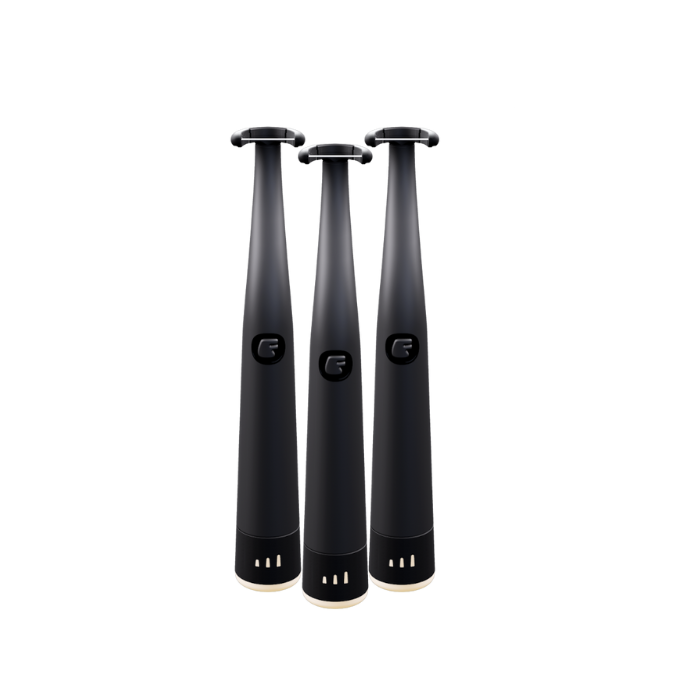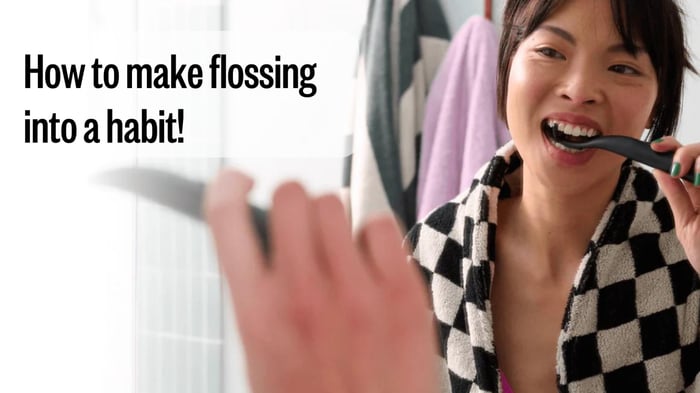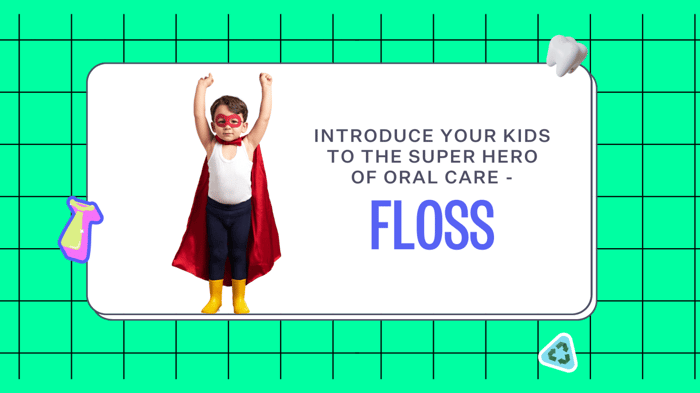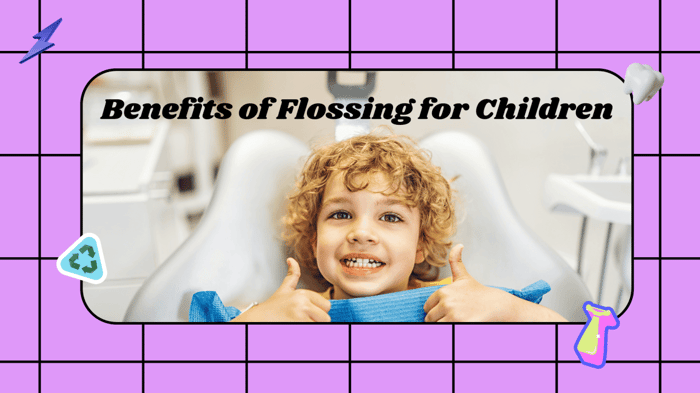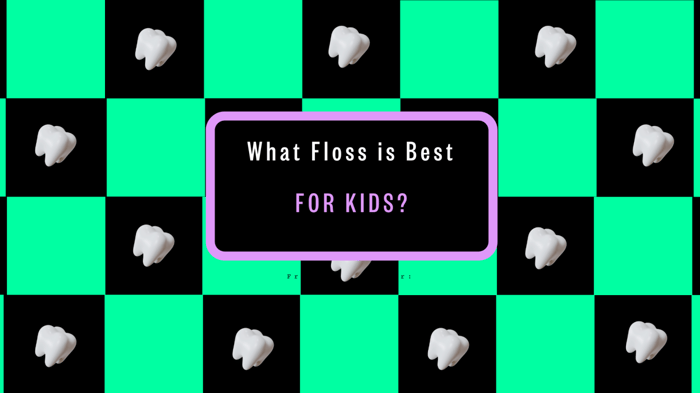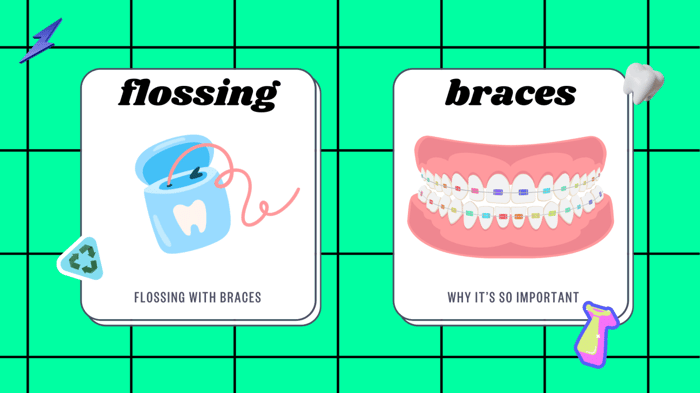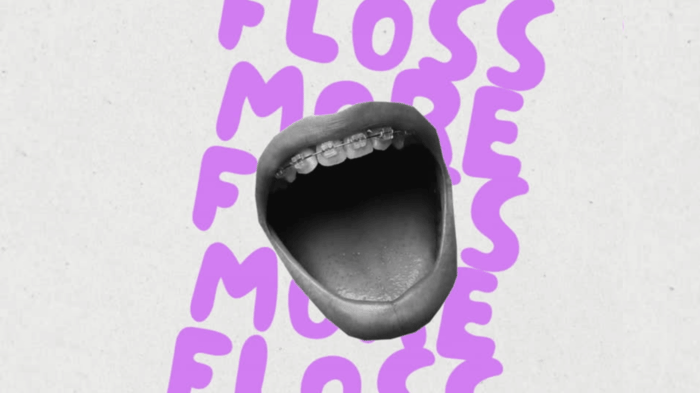How to make flossing a habit is easier than you might think - we promise!. We know - after a long day, the last thing you want to be doing is standing at the mirror, wrapping tight string around your fingers and adding an extra five minutes to your night. But we promise, building a habit can be easy (and flossing can be fun!).
It all starts with setting a clear goal, like deciding to floss every night before you sleep (feels doable, right?). You could set a reminder on your phone or stick a note somewhere visible to help you remember. The results will be worth it! Regular flossing can stop plaque from building up in your mouth, lower chances of cavities and gum issues which leads to better overall oral health. This way, your smile will be happier and healthier too. Let's look at how to set these goals for daily flossing effectively.
One effective method of how to make flossing a habit is to add a visual reminder! Like, putting your floss right beside your tooth brush! Additionally, committing to flossing at the same time each day (like right before you brush your teeth) can make it easier to incorporate into your daily routine.

Setting Goals for Daily Flossing
So, you've decided to make flossing a habit, but where do you start? Setting specific goals for your flossing routine is crucial for building consistency and establishing a healthy dental habit. One highly effective tactic is to be very specific about when and how you will incorporate flossing into your daily routine.
Consider setting a clear target, such as committing to floss once a day before bedtime. This specificity helps create a clear plan of action and makes it easier to track your progress, establishing a clear expectation for yourself, which can be incredibly motivating.
For example, imagine setting a notification on your phone, reminding you to floss every night before bed. This simple act can serve as a powerful prompt, nudging you to adhere to your new flossing routine consistently. Additionally, leaving a sticky note in a visible location—like on top of your bathroom sink or near your toothbrush—can provide a visual cue that reinforces your commitment to daily flossing.
Now that we've discussed the importance of specificity when setting flossing goals, let's consider some achievable targets for incorporating this essential habit into our daily lives.
Benefits of Regular Flossing
First and foremost, regular flossing is an essential part of maintaining good oral health. It helps in removing food particles and plaque between the teeth and along the gum line, places where your toothbrush can't always reach. By doing this, you prevent plaque buildup, reducing the risk of cavities, gum disease, and other unpleasant dental issues.
In fact, research has shown that daily flossing can reduce the risk of gum disease by up to 40%. This is a significant reduction that shows just how impactful regular flossing can be for your overall oral health. Gum disease, if left unchecked, can lead to serious dental and health problems over time, so it's crucial to take preventive steps like flossing.
Imagine gum disease as an intruder trying to break into your house. Daily flossing acts as a sturdy lock on your door, stopping it from breaching and causing damage. It's a reliable defense that keeps your gums healthy and strong.
Besides preventing gum disease, daily flossing also has a notable impact on reducing plaque buildup. The average reduction in plaque buildup with daily flossing is around 30%, according to dental research. Plaque not only affects your teeth but also contributes to developing gum disease and eventually results in tooth loss if left unmanaged. By incorporating daily flossing into your routine, you're actively working towards maintaining healthier teeth and gums.
- Percentage reduction in risk of gum disease with daily flossing: 40%
- Average reduction in plaque buildup with daily flossing: 30%
But the benefits don't end there. Regular flossing also helps in extending the life expectancy of your teeth by an average of 6.4 years—now that's something we can all smile about!
Some might argue that brushing alone should be enough to maintain oral health, but research backs up the significance of adding flossing to your routine. It's like washing your hands—it's crucial to do both to stay clean and healthy.
It's clear that the impact of consistent flossing goes beyond just removing food particles from between your teeth—it's a critical component of maintaining good oral hygiene and preventing potential dental issues such as gum disease and plaque buildup.
How to Make Flossing a Habit? Construct a Flossing Regimen
Starting any new routine isn't always easy, but building a consistent flossing regimen is essential for for success, maintaining excellent dental health and preventing oral diseases. One of the first considerations is timing. Many people wonder, "When is the best time to floss?" The truth is, the best time to floss is whenever you will actually do it. Whether it's before brushing your teeth in the morning (we always want to floss before we brush) or before going to bed at night, carve out a few minutes from your day that are dedicated to flossing.
Once you've settled on a time, it's time to consider the techniques involved in effective flossing. Contrary to popular belief, there's more to it than just snapping the floss between your teeth. To ensure you're maximizing your efforts, start by gently working the floss between each tooth, curving it into a C-shape form against each tooth surface and gently sliding it up and down beneath the gumline.
Remember: Bringing the floss gently to the gum line is key. Aggressive flossing can lead to gum irritation and bleeding.
For those who find traditional floss challenging to use, try an electric flosser, like Flaus, which offers convenience and ease of use for reaching the back teeth.
Building a sustainable routine involves committing to regular daily sessions and incorporating techniques that fit comfortably into your routine while choosing the appropriate tools that make the process efficient and convenient for you personally.
The persistence required in forming a healthy habit cannot be emphasized enough. Flossing only takes a few minutes each day, but it plays a crucial role in preventing plaque buildup and reducing gingivitis. It's not just about removing food particles; it's about maintaining the health of your gums and teeth in the long run.
Given this information, using the right type of floss for your mouth is equally important. Waxed or unwaxed, multifilament or monofilament—there are various types of dental floss available, each catering to specific preferences and dental requirements.
With patience and perseverance, forming a daily habit of flossing will soon become second nature, contributing significantly to your oral hygiene and overall health.
Alerts and Reminders
In this digital age, our phones can be a major assistance in helping us remember to care for our teeth. Setting reminders or alarms at specific times of the day can serve as a gentle nudge to incorporate flossing into our schedules. Around 75% of people forget to floss regularly, but research shows that about 90% of those who set daily reminders establish a flossing habit.
Phones are always with us, so they’re the perfect tools to help us remember when it’s time to floss. Many people find alerts and reminders helpful in maintaining their flossing routine. It's like having a personal dental assistant that reminds you every day to take care of your teeth.
Tying Flossing to an Existing Habit
Remembering to floss might seem challenging at first, but here's where habit formation science comes in. It's easier to stick with a new behavior when we tie it to something we already do every day.
Adding a new action into an established routine is an effective strategy because it taps into the power of existing habits to reinforce new ones. Just like how some people automatically reach for their phone first thing in the morning, associating flossing with another regular action makes it easier to remember. For example, always floss right before you brush! Since brushing your teeth is already part of your routine, it's easier to remember to floss when you do it at the same time as an already established habit.
Think of it like pairing two good friends who will always remind each other about their plans and commitments. They become reliant on each other and look out for one another.
These little actions have big impacts on our habits and ultimately on our dental health.
Harnessing the power of personalized strategies is pivotal in establishing robust habits. Now, let's delve into personalized flossing techniques that can transform your dental care routine even further.
Personalized Flossing Techniques
When it comes to flossing, it's not a one-size-fits-all situation. Our teeth are as unique as we are, and some of us have specific dental concerns that require special care when flossing. For instance, if you have braces, dental bridges, or dental implants, the standard flossing technique might not be the most effective. Therefore, it is important to tailor your flossing routine to meet your specific dental needs.
Let's take braces as an example. If you have braces, traditional floss may be difficult to use underneath the wires and around the brackets. In this case, using a floss threader or a water flosser can make it easier to navigate between the wires and properly clean the teeth. This targeted approach ensures that food particles and plaque are effectively removed from hard-to-reach areas.
Keep in mind: Adapting your flossing technique according to your specific dental structure can make a significant difference in your overall oral health. It is essential to find the technique that works best for you in order to maintain good oral hygiene.
For those with dental bridges or implants, using specialized interdental brushes or soft picks can make it easier to clean around these dental prosthetics. These tools are specifically designed to access the spaces between teeth and around dental work, offering a more thorough clean than traditional floss.
It's expedient to remember that asking your dentist for personalized recommendations is always a great idea. They can provide valuable guidance on the best flossing techniques based on your specific dental condition, and they can even demonstrate how to use special tools effectively.
Tailoring your flossing practices to suit your individual dental requirements doesn't just improve your oral hygiene—it's also an investment in the long-term health of your teeth and gums. By incorporating these personalized techniques into your daily routine, you can ensure that you are effectively preventing tooth decay, gum disease, and other dental issues associated with inadequate oral care.
As we continue our exploration of optimal dental habits, let's now shift our focus towards the synergy between flossing and brushing—how these two simple practices work together harmoniously to promote exceptional oral health.
Flossing Alternatives

For those of us who are simply negligent flossers - we might need something that makes flossing easy and comfortable - like an electric flosser! A great alternative to traditional flossing are electric flossers, like Flaus.
Electric flossers are a great way to maintain good oral hygiene, and Flaus is a good option for those looking for an eco-friendly and effective electric flosser. Here are some reasons why using an electric flosser is a great alternative to traditional flossing:
- Easy Reach: They can reach tight spaces and molars easily due to the ergonomic handle
- Easy to use: Electric flossers are easy to use and require less manual dexterity than traditional flossing
- Comfortable: They can also be less messy and more comfortable to use than string floss, as you don't have to put your fingers in your mouth
- Encourages good habits: Many people find electric flossers more enjoyable to use than traditional floss, which can encourage them to floss more regularly
- Eco-friendly: Flaus is the world's first eco-friendly electric flosser, which can reduce waste and help protect the environment. Flaus uses 90% less floss than traditional flossing and offers a Flaus head recycling program to ensure that the floss heads are properly recycled at a dedicated oral care recycling facility.
Some of the features that Flaus has include:
- Sonic vibrations: At 18,000 sonic vibrations/min, Flaus moves quickly and easily between tight teeth to massage gums and remove plaque and debris from tight spaces your toothbrush can’t reach.
- Ergonomic Soft Touch Handle: With a design that feels as familiar as your favorite electric toothbrush, Flaus′ premium, ergonomic soft-touch handle gives you full control over hard-to-reach places while keeping your fingers (and the 10 million bacteria that live on them) out of your mouth.
- Waterproof: Whether you are flossing on the go or multi-tasking in the shower, Flaus is waterproof and has you covered.
- High Performing Floss Heads: Floss heads are fitted with high performing glide floss strong enough for the tightest of teeth, made with recyclable plastic and use 30% less plastic than traditional floss picks. You can also recycle your Flaus heads through a Floss Head recycling program where the floss heads are sent to be recycled in a dedicated oral care recycling facility.
- Two Month Battery Life: The rechargeable flosser has a two month battery life and comes with a charging base and USB cable to boot.
- Dentist Designed and Recommended: Flaus was designed with dental experts from day one to ensure the very best clean.
Overall, electric flossers, like Flaus, can be a great way to maintain good oral hygiene and develop / encourage good habits. They are effective, easy to use, and eco-friendly, making them a good option for those looking for an alternative to traditional flossing.
Synergizing Flossing and Brushing
Flossing and brushing work together like a dynamic duo, fighting off dental issues and keeping your smile in top form. Just like washing the dishes is essential for getting rid of most grime, brushing your teeth is a crucial step, while flossing is that final touch that removes any stubborn particles stuck between them.
When it comes to the sequence of activities, neither is more important than the other, but they do have an optimal order that increases their effectiveness. Flossing first helps dislodge any food particles or stubborn debris/biofilm from between your teeth and at the gumline. Then brushing comes in to clean away those now now loosened debris and food particles.
This sequence not only streamlines your oral hygiene routine but also ensures that both practices have the best chance for success in clearing out debris and bacteria from your mouth.
That's not all there is to it though—think of "how to make flossing a habit" as a tag team match where one prepares the battleground, and then the other delivers the knockout punch. When used together, they provide a formidable defense against cavities, gum disease, and bad breath.
So, forming a sequential routine of brushing and flossing is critical. The combined power of these practices ensures that every nook and cranny is protected within your mouth.
By understanding how brushing and flossing complement each other in maintaining oral health, you can develop a cohesive approach that maximizes their effectiveness. This ongoing commitment will lead to healthier gums, brighter smiles, and fewer dental issues in the long run.
Understanding the synergy between brushing and flossing lays a solid foundation for building an effective dental care strategy. Now let's explore how you can celebrate your dedication to better oral health.
Celebrating Your Dental Achievements
Flossing regularly is a significant achievement in itself and deserves to be celebrated. Doing so creates positive reinforcement for your habit, making it more likely that you'll keep it up. Consider it a badge of honor earned through discipline and care for your dental health.
There are numerous ways to celebrate this accomplishment, and one of the most effective methods is through a rewards system. When you commit to flossing consistently, you deserve recognition and incentivization. Consider setting milestones or targets – such as flossing every day for a week, then a month, and so on – with respective rewards when each milestone is reached. This way, rather than viewing flossing as a mundane chore, it becomes an activity that brings anticipation and gratification.
For example, treat yourself to something enjoyable after reaching each milestone: perhaps a favorite snack, a movie night at home, or some well-deserved relaxation time. By associating pleasurable experiences with the act of flossing, you effectively condition yourself to link positive emotions with the behavior.
Moreover, tracking tools can also be incredibly motivating. This might include using a simple calendar to mark off each day you floss, or utilizing smartphone apps designed for habit-tracking. These tools visualize your progress and act as a constant reminder of your commitment to maintaining good oral hygiene. Watching the streak of consecutive days grow longer can provide significant encouragement to stick to your routine.
For instance, "The 21-Day Floss Challenge" is a popular method where individuals commit to flossing every day for 21 days straight. Research shows that it takes an average of 66 days to form a new habit with consistent reinforcement. By celebrating small victories along the way—like every week or fortnight—you'll find yourself reinforcing the habit in no time.
Even with such celebration strategies in place, setbacks can still occur. It's essential not to be discouraged by occasional slips but instead recommit yourself to continue the journey toward better oral hygiene.
Setbacks happen to everyone—maybe you missed a day due to being unwell or simply forgot amidst a hectic schedule. It's crucial to remind yourself that these are temporary hiccups and do not detract from your overall progress. The key here is resilience and determination—acknowledge the slip-up and endeavor to resume your routine promptly.
So why stop now? You've come so far already in establishing this beneficial daily practice! Keep setting those realistic targets and rewarding yourself in moderation as you reach them—a little celebration goes a long way in reinforcing positive habits like daily flossing.
In fostering a supportive environment for regular flossing, not only will you maintain commendable dental health for yourself, but you'll also inspire others around you to do the same.
How long does it typically take to establish a flossing habit?
It typically takes about 66 days to establish a flossing habit, according to research conducted by Dr. Philippa Lally at University College London. This study found that on average, it took participants over two months of consistent effort for flossing to become an automatic behavior. However, with proper motivation, reminders, and establishing a routine, one can expedite the process and make flossing a daily habit sooner rather than later.
How can I motivate myself to continue flossing regularly, even when it becomes challenging or time-consuming?
One way to motivate yourself to continue flossing regularly, even when it becomes challenging or time-consuming, is to remind yourself of the benefits - like regular flossing reduces the risk of gum disease by 40%. Additionally, make it more enjoyable by finding a flossing routine that works for you, such as listening to your favorite podcast or music while flossing. Remember, the small investment of time now will pay off in better dental health and a confident smile in the long run.
Are there any tools or techniques that can make flossing easier or more enjoyable?
Yes, there are several tools and techniques that can make flossing easier and more enjoyable. One such tool is an electric flosser, like Flaus, which uses sonic vibrations and real dental floss to make flossing as easy and comfortable as brushing your teeth!
What are the potential health benefits of making flossing a regular habit?
Making flossing a regular habit can have numerous health benefits for your dental health. Firstly, it helps remove plaque and food particles from areas that brushing alone cannot reach, reducing the risk of cavities and gum disease. Studies show that regular flossing can significantly reduce gingivitis, with a 40% decrease in bleeding gums reported after just two weeks of daily flossing. Moreover, flossing aids in preventing bad breath by eliminating odor-causing bacteria between teeth. In short, embracing flossing as a daily habit can lead to stronger teeth, healthier gums, and fresher breath.
What strategies can be used to overcome resistance and develop a consistent flossing habit?
To overcome resistance and develop a consistent flossing habit, there are several strategies one can use. Firstly, setting realistic goals and starting with a small daily commitment can make the habit more manageable. Secondly, finding a flossing method that works best for you, such as using floss sticks or water flossers, can make the process easier and more enjoyable. Additionally, incorporating flossing into an existing routine like brushing teeth can help establish consistency. Lastly, staying motivated by tracking progress and rewarding oneself for reaching milestones can further reinforce the habit. According to a study conducted in 2023 by the Dental Association, individuals who used these strategies were 60% more likely to develop a consistent flossing habit compared to those who didn't.
🌟 Discover a Revolution in Oral Care! 🌟 Tired of traditional flossing? Experience the future with the Flaus Electric Flosser. ✨ Faster. Efficient. Effortless. ✨ Don't just read about it, make the switch today!
👉 Get Your Flaus Electric Flosser Starter Kit Now! 👈








